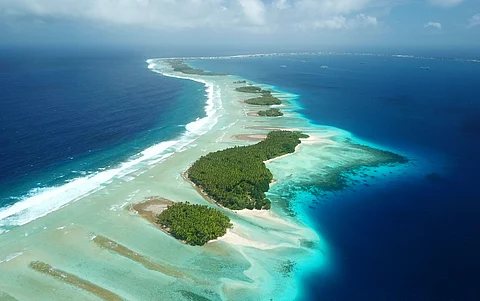

The International Court of Justice's ruling on climate change has been hailed by leaders from small island states and fossil fuel critics.
The decision mandates urgent fossil fuel phaseout, offering hope for vulnerable communities.
It underscores the legal duty of states to protect the planet, reinforcing calls for a Fossil Fuel Non-Proliferation Treaty to ensure concrete climate action.
Leaders from small island developing states (SIDS) as well as critics of fossil fuels have welcomed the July 23, 2025, landmark ruling of the International Court of Justice (ICJ) in the Hague on climate change.
“This initiative was part of efforts to get the action quicker because we have been in the UNFCCC process for 30 years — we are pulling all international levers possible,” Ralph Regenvanu, minister for climate change, Vanuatu, said in a statement.
Vanuatu, located in the Pacific Ocean, is among several SIDS that face the risk of obliteration due to sea level rise brought on by global warming.
“We were part of the group that went to ITLOS and got the advisory opinion. We made a submission as part of the Inter-American court of human rights and are pushing for the crime of ecocide to be recognised by the ICC. We are also part of the Fossil Fuel Non-Proliferation Treaty Initiative, where we’re pushing to get more countries on board and trying everything at the international level to speed up action. Today has been a concrete contribution to that.”
Vishal Prasad, director, Pacific Islands Students Fighting Climate Change, also welcomed the ruling by the court. “By affirming the science, the ICJ has mandated countries to urgently phase out fossil fuels because they are no longer tenable. For Small Island States, communities in the Pacific, young people and future generations, this opinion is a lifeline and an opportunity to protect what we hold dear and love.”
He added: “I am convinced now that there is hope and that we can return to our communities saying the same. Today is historic for climate justice and we are one step closer to realising this.”
Meanwhile, critics of fossil fuels have also welcomed the statements of the ICJ, saying it vindicated their stand.
“This opinion should serve as a clarion call to governments and institutions stalling the fossil fuel phaseout,” said Kumi Naidoo, President, Fossil Fuel Non-Proliferation Treaty Initiative.
“The ICJ has affirmed what we have long known — that states have a legal duty to protect people and the planet from the impacts of the climate crisis, including taking appropriate action to prevent harm from fossil fuels. This reinforces the urgent need for a Fossil Fuel Non-Proliferation Treaty, which offers a bold, clear path to turn these obligations into concrete, just action. We applaud the Pacific states that made the voices of frontline communities and their calls for climate justice heard on the global stage, and catalysed this historic ruling,” Naidoo added.
In its order on July 23, the ICJ affirmed that climate action is not optional: it is a binding legal duty grounded in existing treaty regimes and customary law, including human rights and environmental law.
The Court also acknowledged that states have an obligation to prevent environmental harm, protect present and future generations from the escalating impacts of the climate crisis and to cooperate internationally.
In a significant outcome, the Court found that fossil fuel production, licensing and subsidies “may constitute an internationally wrongful act”.
Importantly, the Court showed a pathway toward a solution — that “Co-operation between States is the very foundation of meaningful international efforts with respect to climate change” and that “treaties and their coordinated forms of implementation are a principal expression” of this cooperation.